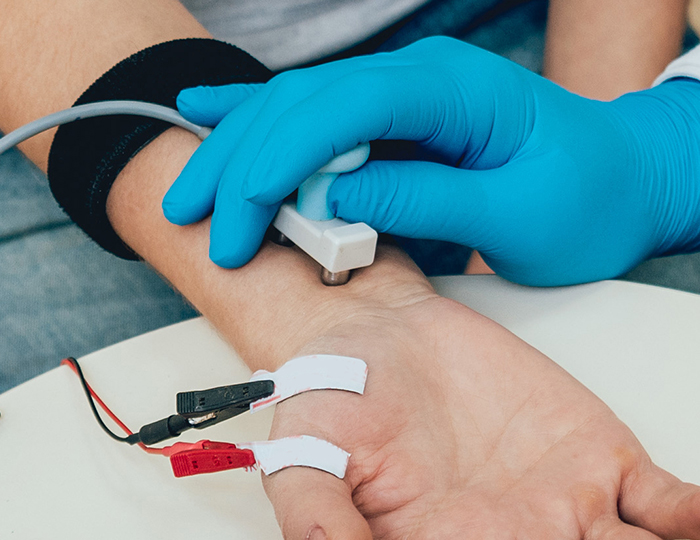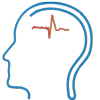EMG & NC Study
EMG & NC Study
Electromyography (EMG) and nerve conduction velocity (NCV) are two procedures that measure the electrical activity of your muscles and nerves.
These tests may be important in determining a spine patient’s diagnosis. Aside from back or neck discomfort, some individuals with a spine-related issue report inexplicable symptoms such as numbness and/or tingling, muscular cramps, or weakening.

What is Electromyography (EMG)?
Electromyography (EMG) is a technique for measuring muscle response or electrical activity in response to nerve stimulation of a muscle. The test is intended to aid in the detection of neuromuscular disorders.
How is the EMG test performed?
One or more tiny needles (also known as electrodes) are introduced through the skin into the muscle during the test. An oscilloscope is then used to show the electrical activity picked up by the electrodes (a monitor which displays the electrical activity of muscles in the form of waves). An audio-amplifier is employed to make the action audible. The electrical activity of the muscle during rest, mild contraction, and strong contraction is measured by EMG.
What is Nerve Conduction Study (NCS)?
NCS is a technique for measuring muscle response or electrical activity in response to nerve stimulation of a muscle. The test is intended to aid in the detection of neuromuscular disorders.
How is the NCV test performed?
Your nerve is stimulated during the test, typically using electrode patches connected to your skin. Two electrodes are put on your skin, just above your nerve. One electrode sends a very modest electrical stimulus to your nerve. It is recorded by the other electrode. Another electrode records the resultant electrical activity. This is done for each nerve that is being examined.
The speed is then determined by measuring the distance between electrodes as well as the time it takes electrical impulses to travel between electrodes.
An EMG is a similar test that may be performed. This device detects electrical activity in your muscles. It is often performed simultaneously with an NCV. Both tests aid in determining the existence, location, and severity of illnesses that affect the nerves and muscles.
What are the conditions detected by EMG and NC studies?
If your EMG NCV test findings are not normal, it may suggest a number of different disorders.
-
Guillain-Barré syndrome is an immune mediated disease.
- Muscular dystrophy is a hereditary illness that has a significant impact on muscle structure and function.
- Carpal tunnel syndrome is a disease affecting the nerves in the hand.
- Herniated disc– This is a condition in which a disc in your spine becomes injured, putting pressure on the spine and causing pain and numbness.
- Charcot-Marie-Tooth Disease-Tooth disease is a hereditary condition that causes nerve degeneration, primarily in the arms and legs.
- Amyotrophic lateral sclerosis, often known as Lou Gehrig’s illness, is a deadly and degenerative disease. It targets nerve cells in your brain and spinal cord, affecting all of the muscles that allow you to move, talk, eat, and breathe.
Are there any side effects associated with the EMG and NC study tests?
It is a safe procedure and does not cause any side effects.
For more information & consultation on EMG & NC Study, Call our expert Dr. Poornima Shah – Consultant Clinical Neurophysiologist in Mumbai on 9820238329 or Book an Appointment
